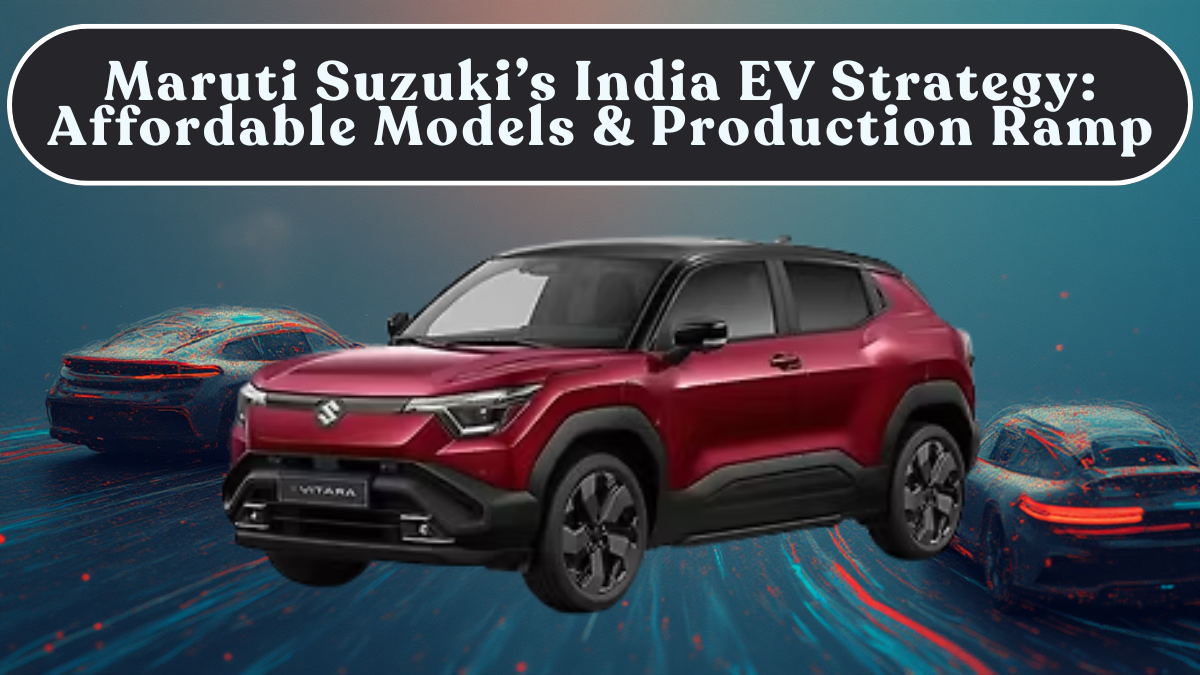India’s largest carmaker, Maruti Suzuki, is finally making its most ambitious move yet into the electric vehicle (EV) segment. After years of anticipation, the company’s EV roadmap is now taking shape, targeting mass-market affordability and large-scale local production by 2026.
As of November 2025, Maruti Suzuki is working aggressively on two new electric vehicles — the Maruti eVX and a compact EV crossover — both designed specifically for Indian roads, climates, and consumer expectations. The company’s strategy hinges on three key pillars: localisation, affordability, and scale.

Let’s dive into what India’s top automaker is planning for the upcoming EV revolution.
Maruti Suzuki’s EV Roadmap: 2025–2026
Maruti’s EV push has been deliberate rather than rushed. Instead of releasing premium EVs first, the company aims to bring electric cars to the masses by combining practical design, long range, and strong after-sales support.
Key milestones in its EV roadmap:
-
Maruti eVX – compact SUV launching in early 2026.
-
Next EV model – a smaller crossover aimed under ₹15 lakh.
-
Localized battery pack production at Gujarat facility.
-
Partnership with Toyota for EV architecture and shared technology.
-
Dedicated EV assembly line at Kharkhoda, Haryana, operational by mid-2026.
Verdict: Maruti Suzuki’s step-by-step approach focuses on reliability, cost efficiency, and wide market reach rather than rushing premium launches.
The Maruti eVX: India’s Game-Changing EV SUV
The Maruti eVX is expected to be the company’s first electric SUV to hit Indian roads. It’s based on an all-new 27PL electric platform co-developed with Toyota, optimized for Indian road conditions.
| Feature | Specification (Expected) |
|---|---|
| Battery Capacity | 60 kWh |
| Range | ~550 km (ARAI-certified) |
| Power Output | 150 bhp (approx.) |
| Platform | 27PL (EV-specific architecture) |
| Charging | 11 kW AC / 150 kW DC fast charging |
The eVX is being locally engineered with Indian temperature tolerance and battery cooling optimisations. It will also feature V2L (Vehicle-to-Load) capability, allowing users to power devices from the car’s battery — a first in this price segment.
Verdict: The eVX will likely set a new benchmark for affordable long-range EV SUVs in India.
Affordable EV Models Under ₹15 Lakh
Beyond the eVX, Maruti Suzuki is also developing a compact EV crossover positioned below ₹15 lakh. This model is being built on a lightweight EV platform derived from its WagonR and Fronx architecture.
Expected specs:
-
Battery capacity: 30–35 kWh
-
Range: 300–350 km
-
Fast charging support: Yes (up to 50 kW DC)
-
Target price: ₹11–₹13 lakh (ex-showroom)
This car will directly compete with Tata Tiago EV, Citroen eC3, and MG Comet EV, giving Indian buyers a trusted, budget-friendly EV backed by Maruti’s service network.
Verdict: This could become India’s most accessible EV for mass adoption, ideal for city commuting and short trips.
Production Ramp-Up: Kharkhoda and Gujarat Facilities
Maruti Suzuki’s EV rollout heavily depends on its domestic manufacturing scale. Two major facilities are at the centre of this plan:
Kharkhoda, Haryana Plant
-
A massive ₹18,000 crore facility focused on EV and hybrid assembly.
-
Initial annual capacity: 250,000 vehicles, expandable to 500,000.
-
Operations expected to start by mid-2026.
Gujarat Battery Plant
-
Managed by Suzuki Motor Gujarat, producing battery packs and motors locally.
-
Target production: 1 million cells annually by 2027.
-
Expected to supply not only Maruti EVs but also Toyota and Suzuki’s global EV projects.
Verdict: With large-scale production and local sourcing, Maruti aims to control EV pricing and reduce dependence on imports.
Partnership with Toyota: Shared Technology
Maruti Suzuki’s collaboration with Toyota goes beyond simple platform sharing. The companies are jointly developing:
-
Electric drivetrains optimised for Indian driving cycles.
-
Solid-state battery research for next-generation EVs.
-
Hybrid powertrain technology as a transition solution.
The Toyota Urban SUV EV, launching globally in 2026, will share components with Maruti’s eVX — including the 27PL platform and key electrical architecture.
Verdict: Toyota’s technical expertise combined with Maruti’s cost advantage could produce India’s most reliable EV ecosystem.
Battery Technology and Localisation
Maruti is prioritising battery localisation as the foundation of its EV strategy. By 2026, over 60% of EV components will be locally sourced.
Key developments:
-
Local lithium-ion cell assembly under Suzuki’s India subsidiary.
-
Exploration of LFP battery chemistry for affordability.
-
Collaboration with Indian firms for battery recycling and reuse.
The focus on localisation aligns with India’s Atmanirbhar Bharat initiative, supporting domestic manufacturing while reducing the carbon footprint.
Verdict: Local battery production will be Maruti’s biggest cost advantage — enabling EVs at scale.
Consumer Strategy: EVs for the Masses
Unlike premium players, Maruti’s EVs will focus on value, practicality, and wide availability. The company’s nationwide dealership and service network will play a critical role in reaching Tier-2 and Tier-3 cities.
Planned initiatives:
-
Dedicated EV service zones across all Nexa outlets.
-
Affordable home charger packages with every EV purchase.
-
Battery warranty of up to 8 years for peace of mind.
-
Finance tie-ups with SBI, HDFC, and ICICI for low-interest EV loans.
Maruti is also investing in public charging tie-ups with state electricity boards and oil companies to improve accessibility.
Verdict: Maruti’s unmatched reach ensures even small-town buyers can access EV infrastructure and support.
Market Position and Future Plans
By 2027, Maruti Suzuki aims to capture 25% of India’s electric car market, targeting sales of 1.5 lakh EVs annually. The company’s roadmap includes:
-
Launching 4 new EV models by 2028.
-
Introducing hybrid-EV dual options for select vehicles.
-
Exporting India-made EVs to Southeast Asia and Africa.
Verdict: Maruti’s long-term strategy ensures India becomes both a producer and exporter of affordable EVs.
Final Verdict
Maruti Suzuki’s electric vision isn’t about luxury or tech extravagance — it’s about democratising EV ownership in India. By combining local production, affordability, and Toyota’s technical strength, the company is positioning itself to lead the mass EV transition.
As India enters 2026, the eVX will likely emerge as the first “people’s EV SUV,” offering long range, local manufacturing, and Maruti’s trusted reliability.
Overall Verdict: Maruti Suzuki’s EV push represents the future of accessible mobility — made in India, for India.
FAQs
When will Maruti Suzuki launch its first electric car in India?
The first model, the Maruti eVX, is expected to launch in early 2026.
What will be the expected range of the eVX?
The eVX will likely offer a range of around 550 km on a single charge.
Will Maruti’s EVs be affordable?
Yes. Maruti plans to launch a compact EV priced under ₹15 lakh, making it one of India’s most affordable electric cars.
Where will Maruti Suzuki manufacture its EVs?
Production will take place at the new Kharkhoda, Haryana plant and the Suzuki Gujarat battery facility.
Is Maruti working with Toyota on its EVs?
Yes. Maruti and Toyota are co-developing the EV platform and battery technology for the upcoming models.
Will charging infrastructure improve for Maruti EV buyers?
Yes. Maruti is partnering with Tata Power, BPCL, and state electricity boards to expand its EV charging network across India.
Click here to know more.
